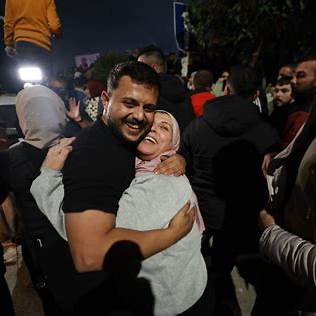January 30, 2025 – In a significant development in the ongoing Israel-Gaza conflict, Israel and Hamas have successfully conducted their third hostage-prisoner exchange as part of a ceasefire agreement brokered by Egypt, Qatar, and the United States. The exchange comes amid intensified diplomatic efforts to maintain the fragile truce and allow for humanitarian aid to reach the devastated Gaza Strip.
The Exchange Details
On Tuesday night, Hamas released three Israeli hostages—Agam Berger, Arbel Yehud, and Gadi Moses—alongside five Thai nationals who were abducted during the October 7 attack on southern Israel. The hostages were handed over to the International Committee of the Red Cross (ICRC) and were then transferred to Israel, where they underwent medical evaluations before being reunited with their families.
In return, Israel released 110 Palestinian prisoners, including several minors, from its detention facilities. The prisoners, many of whom were accused of security-related offenses, were welcomed in the West Bank and East Jerusalem by large crowds celebrating their release. Some were received as heroes, with processions and speeches held in their honor.
A Ceasefire Under Pressure
The ongoing temporary truce, which was initially agreed upon to facilitate hostage-prisoner exchanges and allow aid into Gaza, remains fragile. While it has temporarily paused Israeli airstrikes and Hamas rocket attacks, tensions remain high. Israeli officials have warned that military operations in Gaza will resume if Hamas does not release more hostages as agreed.
Hamas, on the other hand, has demanded the release of more Palestinian prisoners, particularly women and teenagers, as a condition for further negotiations. The group has also called for a long-term ceasefire and an end to Israeli military activity in Gaza, conditions that Israel has so far rejected.
International Reaction and Humanitarian Concerns
The international community has cautiously welcomed the latest exchange, with United Nations Secretary-General António Guterres urging both sides to extend the truce and work towards a permanent ceasefire. The UN and various aid organizations have also emphasized the dire humanitarian situation in Gaza, where thousands remain displaced due to ongoing fighting.
Meanwhile, families of Israeli hostages still held by Hamas have pleaded with the government to prioritize further negotiations over a full-scale military offensive. Over 130 hostages remain in Gaza, including Israeli civilians and foreign nationals. The Israeli government has insisted that military pressure is necessary to secure their release.
What Comes Next?
As the ceasefire nears its expiration, all eyes are on Egyptian and Qatari mediators, who are working to extend the truce and facilitate additional exchanges. While the latest swap offers a glimmer of hope, the situation remains uncertain, with both Israel and Hamas preparing for possible renewed hostilities.
The fate of the remaining hostages and the broader stability of the region hinge on whether both sides can reach a more comprehensive agreement—or whether the cycle of violence will resume.


